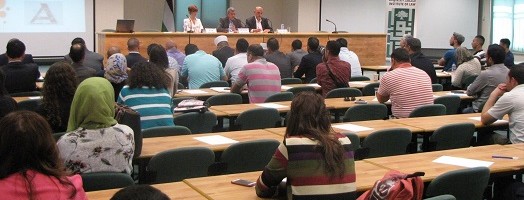The New Israeli Military Order: Applying the Israeli Penal Code on the Palestinian Prisoners
Applying the Israeli Penal Code on the Palestinian Prisoners. The presentation was delivered by Mr. Issa Qaraqe’, Chairman of the Palestinian Commission of Detainees and Ex-Detainees Affairs, and Ms. Abeer Bakr, Human Rights Lawyer and Expert in Prisoners Cases. The legal encounter brought together a significant number of members of the legal community, academics, representatives of civil society organisations, and students of Birzeit University.
In his opening remarks, Dr. Ghassan Faramand welcomed and thanked Mr. Qaraqe’ and Ms. Bakr for accepting IoL’s invitation and delivering the legal encounter. Overviewing their harsh conditions, Mr. Qaraqe’ Israeli elaborated on Israel’s violations against Palestinian prisoners held in Israeli prisons and the role Israeli courts play in consolidating occupation of the Palestinian territory.
In the backstage, the Israeli judicial apparatus uses law as a tool and cover of occupation. Rather than applying international law, Israeli courts legitimate encroachments on Palestinians, including torture of prisoners, extrajudicial killings, home demolitions, administrative detention (arrest without charge or trial), and military trials of minors.
Mr. Qaraqe’ highlighted steps that should be taken to confront these challenges. An inclusive legal vision will by developed to follow up on issues of Palestinian prisoners and detainees. National and international efforts will be made to prepare legal files. In light of Palestine’s recent accession to international bodies, the case of Palestinian prisoners will also be brought before international forums, including the International Court of Justice and International Criminal Court.
Ms. Bakr provided a review of Israeli Military Order 1754. Political and legal dimensions of military orders applied to Palestinians cannot be separated. Responding to Israeli claims that commended amendment of the Military Order 1754, Ms. Bakr stressed that International Humanitarian Law and International Law of Human Rights, not Israeli laws, are applicable to Palestinians. Amendments to Israeli military orders are designed to improve the international image of the Israeli occupying power and introduce the “bright” side of occupation. In this context, Israel appears as if it treats Palestinians using legal systems that are similar to international norms. In reality, the Israeli legal apparatus is tailored to annex the occupied Palestinian territory.
According to the Geneva Conventions, the occupying power’s mandate is limited and should remain minimal. Amendments to military orders do not mark a substantive change of the Israeli colonial state’s mandate. In disregard of international law and Palestinian right to self-determination, Israeli colonial practices create a legal and judicial system and use a peculiar legal language terminology.
In the ensuing discussion, the audience made several informed interventions. Highlighting Israeli apartheid practices, most participants stressed that Israeli courts should be boycotted. Strategies should also be devised to deconstruct the Israeli colonial regime.











